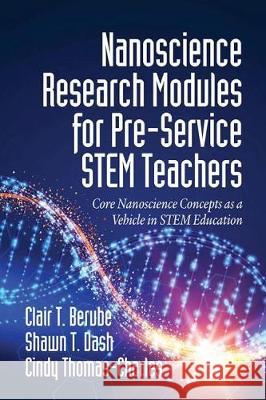Nanoscience Research Modules for Pre-Service STEM Teachers: Core Nanoscience Concepts as a Vehicle in STEM Education » książka
Nanoscience Research Modules for Pre-Service STEM Teachers: Core Nanoscience Concepts as a Vehicle in STEM Education
ISBN-13: 9781641135528 / Angielski / Miękka / 2019 / 78 str.
Nanoscience Research Modules for Pre-Service STEM Teachers: Core Nanoscience Concepts as a Vehicle in STEM Education
ISBN-13: 9781641135528 / Angielski / Miękka / 2019 / 78 str.
(netto: 170,80 VAT: 5%)
Najniższa cena z 30 dni: 178,24
ok. 30 dni roboczych.
Darmowa dostawa!
STEM (science, technology, engineering and mathematics) is a fairly new concept in American education. As separate subjects, science and math have been around for a long time but have rarely been taught as a seamless unit of skills; rather as discreet content areas. This is not how the real world outside of the classroom functions however; in actual research laboratories scientists infuse their science with math, and their math with science, and along with technology and engineering they solve real life problems. In practice you cannot separate the various fields, as you need all of them in order to discover the underpinnings of the natural world, cure a disease, or solve a problem with the space rover. The American future depends on a scientifically literate workforce, armed with knowledge about the laws and theories of science, based on empirical facts instead of beliefs. In addition, there is a shortage of graduates in STEM related disciplines. Economic data show that 1 million additional STEM graduates will be needed over the next decade to fill America's economic demand. STEM based jobs are expected to grow 17% in the next 10 years, outpacing the overall job growth of 10%. If teachers across America were trained with fundamental and impending scientific concepts in their science-methods courses at the university level, scientific literacy can only dramatically improve. Nanoscience is one such concept; as it is multidisciplinary in nature and is regarded as the basis for innovated technologies in many fields. The authors of this book seek to provide pre-service and in-service science teachers with high-quality STEM modules, with which to create lesson plans and problem-based lessons to use in their future classrooms, both at the elementary and secondary level. Nanoscience was chosen since its applications reaches across virtually every scientific field; from biology to physics and for that matter all STEM domains.











